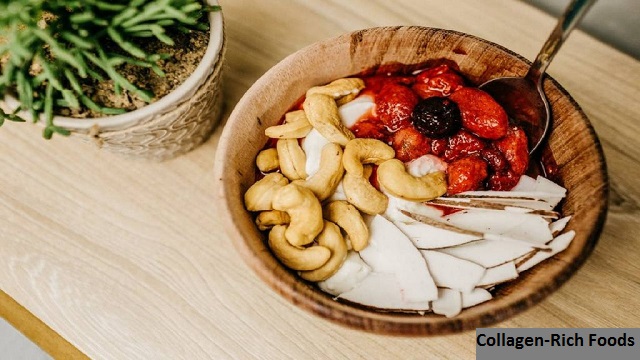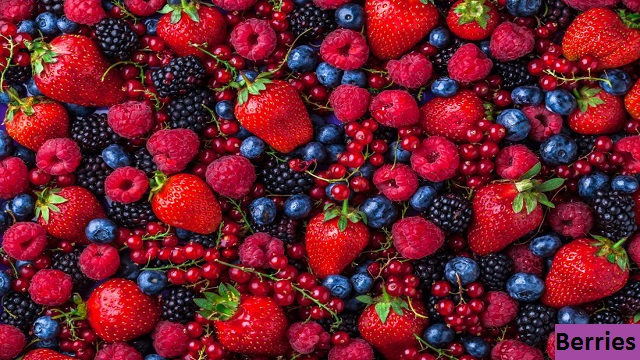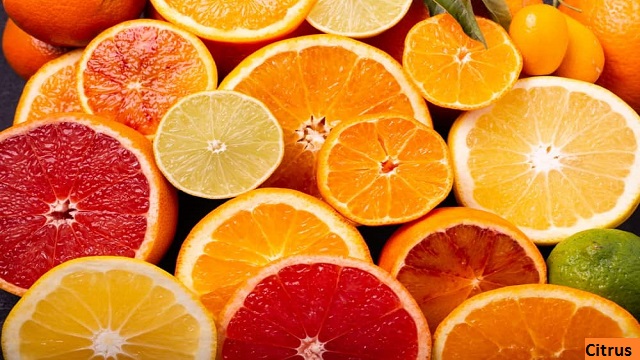
Collagen-Rich Foods To Boost Collagen Production And Delay Aging Symptoms:
The good news is that you can get collagen naturally from nutrient-rich foods in your diet, but can you really get it that way? While eating more foods high in antioxidants and vitamins like C and E can help reduce signs of aging for the skin, and support your hair, and nails, your best bet for increasing natural collagen levels in the body is actually from supplementation.
Where Does Collagen Originate?
There are other uses for collagen, which is a protein. The majority of the protein in our bodies, between 30 and 40 percent, is made up of collagen, which is present throughout the body. But it’s probably not the protein you imagine; collagen provides protein to the body in the form of connective tissue and structure for our organs.
The dermis (skin), the interstitial fibrous tissue between muscle fibers, and our tendons—as a convolute of fibers—are just a few places where we can find the majority of the collagen in our bodies.
The body’s production of collagen.
Up until our late 20s, our bodies are collagen production powerhouses. Our body’s natural collagen production starts to decline around this time. Sad, right? The body’s decreased ability to produce collagen contributes to aging symptoms on the inside and outside of people. Rheumatoid arthritis and tendon degeneration are two other diseases that are exacerbated by low collagen levels and production.
Low levels of collagen can be detected by:
- wrinkled skin.
- joint discomfort.
- cartilage that is worn.
- a loss of muscle.
- GI & digestive problems.
How To Boost Collagen Naturally With Foods That Promote Collagen?
Having a robust and nutrient-rich diet can increase the bio availability of amino acids, antioxidants, minerals, and vitamins, even though our bodies’ natural collagen production gradually declines as we age. While this effort is admirable, Dr. Bradley of the Cleveland Clinic warns that the nutrients may not always be effectively absorbed. He goes on to say that you might need to take dietary supplements to “make sure your body has enough ingredients to make collagen”.
Even though taking supplements is the best option, adding more vegetables and nutrients to your diet can’t hurt, so we’ve included a list of rich foods that promote collagen below.
loss of adaptability.
Foods High in Collagen.

Bone Broth:
Because it contains a lot of collagen, bone broth is healthy for you. (Drat!) Chicken, fish, or beef bones are used to make bone broth. For you to consume, the collagen is extracted from the bones during the making of bone broth. It can be consumed on its own or combined with other rich foods and beverages, such as soup. In the past, bone broth was known as stock, and yes, bone broth and stock are basically the same thing. Bone broth first gained popularity for its collagen-rich food properties.
Contrary to popular belief, making your own bone broth is preferable to buying it at the store. A 2018 study that was published contradicts this, which is the reason.
Commercial bone broths are lower in all amino acids than the home-made varieties, making it unlikely that they will contain a reliable concentration of collagen precursors compared to supplemental sources of collagen for standardized preparations.
Making bone broth at home and adding pure collagen hydrolysate protein powder as a supplement is recommended if you want to get the most benefit possible from it.
Avocado:
It goes without saying that avocados are healthy fat, high in vitamin E, and have antioxidant properties. According to research, vitamin E can lessen wrinkles. Not so quickly, though, in terms of collagen production. Vitamin E is a significant, naturally occurring, non-enzymatic lipid-soluble antioxidant that shields the skin from oxidative stress‘ damaging effects.
Therefore, instead of popping a pill, start thinking of the vitamin E in avocados as a way to slow the signs of aging by protecting the dermis (skin) against environmental agents that create damage.
Chicken:
There is a good reason why chicken is used to make many collagen supplements. There are plenty of it in everyone’s favorite white meat.If you’ve ever dissected a whole chicken, you’ve probably noticed how much connective tissue poultry contains. Because of these tissues, chicken is a great source of dietary collagen.
Fish:
Fish’s bones and ligaments are made of collagen, just like those of other animals. Some claim that marine collagen is among the easiest to absorb.
Although eating a tuna sandwich for lunch or salmon for dinner can increase your collagen intake, you should be aware that the “meat” of fish contains less collagen than other, less appetizing parts.
Fish parts with the highest collagen content, such as the head, scales, and eyeballs, are not typically consumed, according to Gabriel. In fact, scientists have used fish skin as a source of collagen peptides.

Berries:
Berries are another great source of vitamin C, even though citrus fruits typically receive all the attention for having high levels. Strawberries are a better source of vitamin C than oranges, ounce for ounce. Blackberries, blueberries, and raspberries also provide a substantial serving.
Furthermore, berries are rich in antioxidants, which shield the skin from harm, adds Davidson.
Garlic:
Your pasta dishes and stir-fries might benefit from the additional flavor that garlic can provide. It might increase the amount of collagen you produce. “Garlic is high in sulfur, a trace mineral that aids in the synthesis of collagen and prevents its degradation,” claims Gabriel. ”
But it’s important to remember that how much you eat matters. To benefit from collagen, she continues, “you probably need a lot of it.”.
However, given all of its advantages, you should think about including garlic in your daily diet. Online adage: If you love garlic, double the amount called for in a recipe.

Citrus:
These delicious rich foods contain vitamin C, which the body needs for skin health, as an antioxidant, and as a key component in the synthesis of collagen. The production of collagen is not increased by rich foods high in vitamin C, but it is encouraged nonetheless.
According to studies, vitamin C is “most useful in the treatment of photo-damage and/or skin wrinkling ” and “most effective in protecting against damage induced by UV light.”
Oranges, grapefruits, lemons, and limes, to name a few, are citrus fruits with some of the highest vitamin C content of any rich food. While adding more citrus to the diet is a great idea, there is debate over whether vitamin C should be applied topically or consumed orally.
Additionally, it has been demonstrated that topical vitamin C can reverse some of the structural alterations brought on by aging at the dermis-epidermal junction. However, not everyone experiences the effects of topical vitamin C, and interestingly, one study discovered that people who consume large amounts of vitamin C through their diets either did not experience any effects at all or experienced only a minimal effect.
It was discovered in two human studies that oral vitamin C supplementation did not improve skin’s photo-protection against UV light. Collagen is a structural protein that is well-studied, and vitamin C controls how it is made. According to research, when vitamin C is combined with other micronutrients like vitamin E and zinc, it has the biggest effects on collagen production.
Our advice is to mix collagen powder into your daily glass of orange juice to provide your body with a significant amount of collagen and vitamin C. We assure you that it will thank you.
Dark Leaf Greens.
Dark leafy greens are not a collagen-rich food either, but according to internet lore, they help slow the signs of aging and prevent the body from breaking down collagen. According to one study, drinking a beverage containing chlorophyll for 90 days reduced facial wrinkles and increased skin elasticity in female volunteers over the age of 45. Type I procollagen synthesis was elevated over baseline.
The benefits of chlorophyll and collagen production are not well understood or supported by research, despite the fact that the pigment that gives leafy greens their green color is scientifically proven to fight free radicals, boost your resistance to oxidative stress, slow the signs of aging, and reduce inflammation.
Increase your consumption of dark leafy green vegetables if you want to get healthier and feel better overall. We advise enhancing your nutritionally dense diet with a hydrolyzed collagen peptide powder if you’re looking to specifically increase your natural collagen production and bioavailability.
Eggs:
When collagen is being produced, sulfur is a crucial ingredient. Although there isn’t a lot of research on this, some evidence points to a diet lacking in sulfur as a possible cause of decreased collagen synthesis and increased skin wrinkling.
Additionally, sulfur has advantages because it helps the body make glutathione, a vital antioxidant that protects cells from free radical damage. Again, supplementing collagen is your best bet to use as a skin-aging tool if you’re hoping to benefit from collagen production.
Fighting Aging at a Rapider Rate:
Instead of Botox, injections, and unsettling facelifts, start consuming foods and supplements that are high in collagen and collagen-boosting nutrients to get the nutrients you need to fight the signs of aging.
Your overall health, wellbeing, and appearance can all be significantly improved by the rich foods you eat, but collagen production is not always increased. In order to fill in any nutritional gaps and reap the physical and aesthetic benefits, supplements can be used.
While there are many foods that are high in antioxidants and vitamins that can support a healthy lifestyle and delay the onset of aging, supplements are not meant to replace a balanced diet. A collagen-rich hydrolysate protein supplement is the best way to achieve these goals.
How much collagen should you take every day?
Healthy, physically active people are advised to aim for a daily body weight gain of between 1 and 2 grams per kilogram of body weight. The recommended daily range for older adults is 1 to 2 points/kg of body weight.
The advantages of consuming collagen can help athletes stimulate protein synthesis, strengthen ligaments and tendons, reduce joint pain, all while aiming to help prevent injury. Collagen hydrolysate powder can complement your nutritional goals in addition to helping you achieve these other benefits. Athletes can benefit from taking collagen daily in addition to health enthusiasts.
The Best Natural Way to Increase Collagen Production:
So how do you increase collagen production? Well, we recommend enhancing other facets of your lifestyle in addition to maintaining a healthy diet and including collagen-rich foods in it.
Reducing exposure to pollutants and toxins in the environment, quitting smoking, eating fewer refined and processed foods, and giving up sugar are all ways to delay the onset of aging. These factors can all have a significant impact on the body’s declining collagen levels.
The best way to increase collagen production in the body is by taking collagen hydrolysate supplements, even though a nutrient-rich food diet rich in antioxidant, vitamin, and mineral-rich foods is fantastic for reducing the signs of aging and improving your overall quality of life.
Although there are foods that are’supposed’ to aid in your body’s natural collagen production, you are better off actually ingesting collagen from a supplement. We can assure you that collagen supplements are not false advertising.
Read More: L-Tyrosine
Leave a Reply